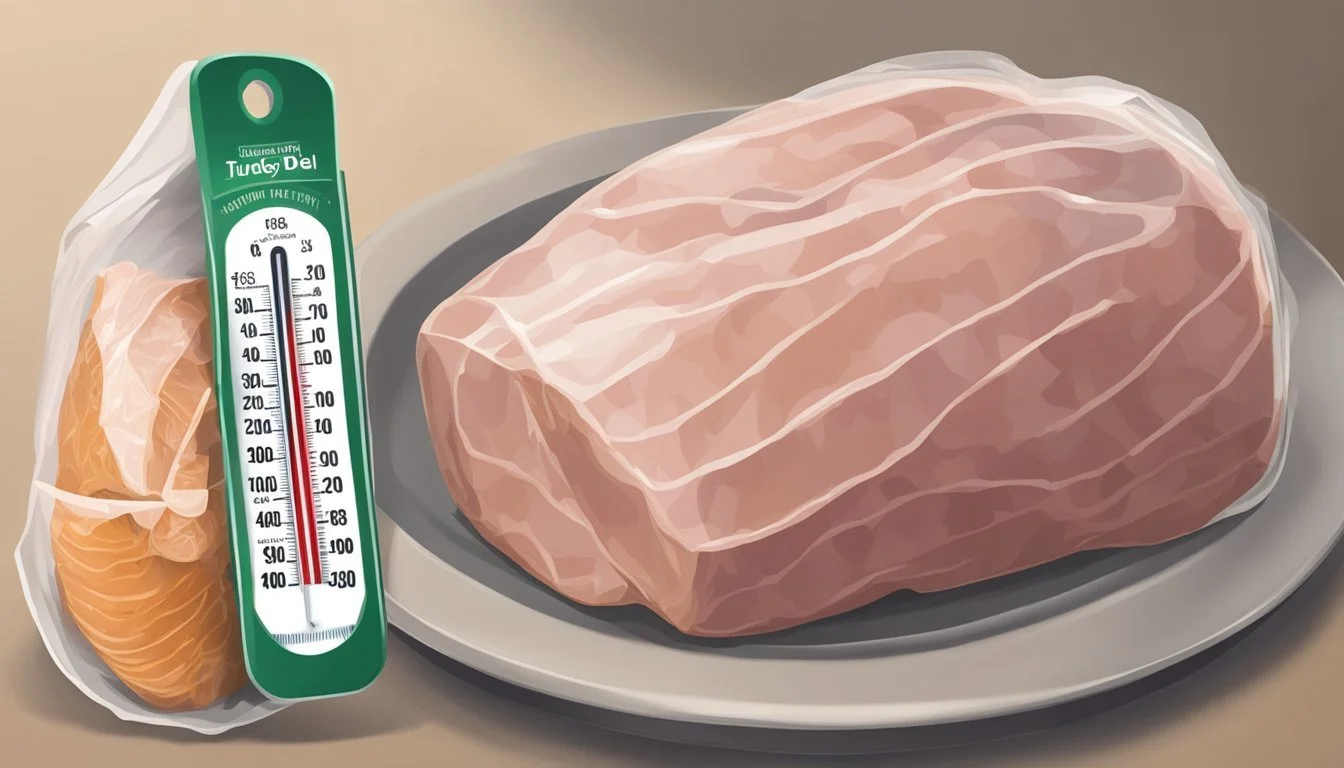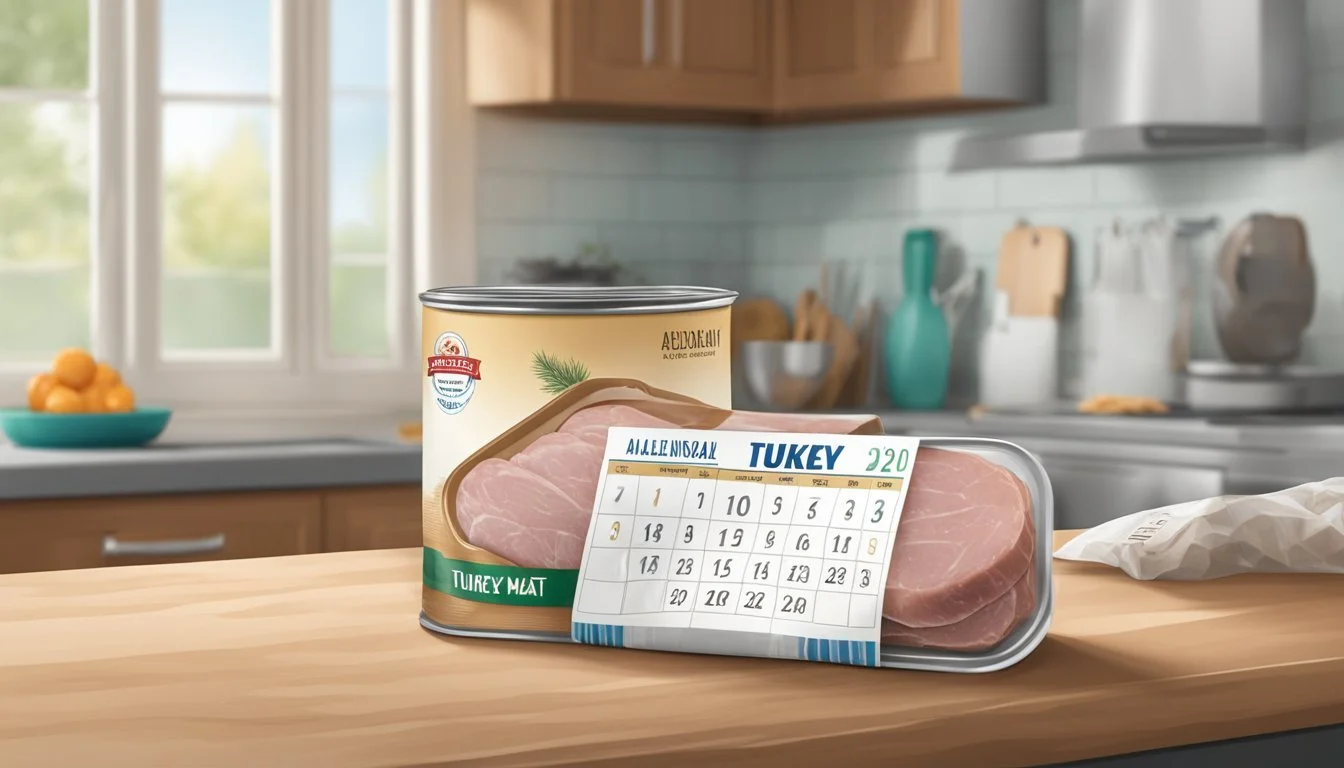How Long Does Turkey Deli Meat Last?
Understanding Shelf Life and Storage Tips
When considering the shelf life of turkey (What wine goes well with turkey?) deli meat, it's crucial to understand that the duration it remains fresh is contingent upon various factors such as packaging, refrigeration, and whether it's been opened. Typically, pre-packaged turkey deli meat can last in the refrigerator for up to two weeks if it remains unopened and properly stored. Once opened, however, it's best consumed within 3 to 5 days to ensure quality and safety.
The environment within a refrigerator plays a key role in preserving the quality of turkey deli meat. It's essential to maintain the meat at a consistent temperature, ideally at or below 40 degrees Fahrenheit, to inhibit bacterial growth. The quality of the turkey deli meat is also a significant factor; fresh slices should generally be moist but not slimy or discolored, characteristics that indicate spoilage. To extend its freshness, store deli meat in airtight containers or tightly sealed plastic bags to minimize exposure to air.
Understanding Turkey Deli Meat
Turkey deli meat, a popular choice for sandwiches (What wine goes well with sandwiches?) and salads, is known for its lean protein content and versatility in meal preparation. This section dives into the different types of turkey deli meat and their nutritional profiles.
Types of Turkey Deli Meat
Turkey deli meat comes in various forms, catering to different tastes and dietary requirements:
Sliced Turkey: Thinly cut pieces from whole turkey breasts, typically found pre-packaged or freshly sliced at the deli counter.
Smoked Turkey: Turkey that has been smoked over wood chips, imparting a distinct flavor.
Cured Turkey: This variety is treated with a mixture of salt, seasonings, and sometimes sugar to extend its shelf life and enhance taste.
Each type offers a unique flavor and texture, from the mild taste of sliced turkey to the robust profile of smoked or cured options.
Nutritional Value
Turkey deli meat is recognized for its nutrition, particularly:
Protein: A high source of lean protein, crucial for muscle repair and growth.
Calories: Generally lower in calories compared to other deli meats like salami or ham.
Fat: Most turkey deli meat options have reduced fat content, although the values can vary depending on the processing methods.
Here is a simplified nutritional table for standard turkey deli meat:
Nutrient Average Amount per 2 oz serving Calories 60-70 Protein 9-11 g Fat 0.5-2 g Saturated Fat 0-0.5 g Sodium 450-650 mg
While turkey deli meat is a healthier luncheon meat choice, it's still important to consider the sodium content, which can be high in cured types.
Storage Fundamentals
Proper storage is critical to extending the shelf life of turkey deli meat. It not only preserves the meat’s quality but also ensures food safety.
Ideal Storage Conditions
Turkey deli meat thrives in cold, airtight environments. The ideal conditions to store deli turkey include a consistent refrigerator temperature of 40°F (4°C) or below. Exposure to air can lead to faster spoilage and the growth of bacteria, so keeping the meat airtight in its storage is paramount.
Refrigerator vs. Freezer
Refrigerator:
Always use an airtight container, plastic wrap, or aluminum foil to store turkey deli meat in the fridge.
The safe refrigerator storage time for opened turkey deli meat is 3 to 5 days.
Freezer:
For longer storage, wrapping the turkey in plastic wrap, followed by aluminum foil, and placing it inside a freezer bag can keep it safe for consumption.
In the freezer, turkey deli meat maintains its quality for 1-2 months. When ready to use, thaw it in the refrigerator, not at room temperature.
Shelf Life and Spoilage
Turkey deli meat has a specific shelf life and recognizing spoilage is key to ensuring food safety. This section outlines the importance of expiration and sell-by dates, identifies spoilage signs, and discusses the role of temperature and air exposure in preserving the quality of deli meat.
Expiration and Sell-By Dates
Expiration Date: The date when the turkey deli meat is considered no longer safe to consume. Deli turkey often lasts for 3-5 days in the refrigerator after opening.
Sell-By Date: This date indicates how long the store can display the product for sale. It is not a safety-related date. Unopened pre-packaged turkey deli meat can last about two weeks in the fridge, assuming it is stored correctly up until the sell-by date.
Signs of Spoilage
Deli turkey meat exhibits clear signs when it has gone bad:
Color Change: Fresh turkey deli meat has a uniform color. A change in color, notably a grayish hue, indicates spoilage.
Texture: When spoiled, the meat might have a slimy or sticky texture. Consuming turkey with such a texture is not recommended.
Smell: An off odor or unpleasant smell from turkey deli meat suggests bacterial growth and spoilage.
Role of Temperature and Air Exposure
Temperature: Turkey deli meat should be stored at 40°F or below. Temperatures over 40°F increase the risk of bacterial growth.
Temperature Range Action to Take 40°F or below Safe to store Above 40°F High risk of spoilage
Air Exposure: Reducing air exposure by using airtight containers or plastic wrap helps extend turkey deli meat's freshness. Meat exposed to air is likely to spoil faster due to the increased chance of bacterial contamination.
Handling and Usage
Proper handling and storage of turkey deli meat is essential for maintaining food quality and safety. This section provides guidance on preventing foodborne illness and tips to extend the shelf life of deli turkey, ensuring it remains a safe and enjoyable addition to sandwiches, wraps, salads, and casseroles.
Preventing Foodborne Illness
To prevent foodborne illness, it is crucial to practice good hygiene and proper food safety techniques when handling sandwich meat. After purchasing fresh deli turkey, it should be stored in the refrigerator at 40 degrees Fahrenheit (4 degrees Celsius) or below to reduce the risk of bacterial growth. The USDA recommends that consumers always:
Wash their hands thoroughly with soap and water before and after handling deli meats.
Use separate cutting boards for raw meats and ready-to-eat foods to avoid cross-contamination.
Ensure that any utensils, dishes, or surfaces that come into contact with the deli turkey are cleaned before use.
If deli meat is to be frozen, proper thawing methods such as using the refrigerator or microwave should be employed to maintain food safety.
Tips for Extending Shelf Life
To prolong the quality and freshness of deli turkey, one should:
Store deli turkey in the refrigerator immediately after purchase and after each use.
Keep the meat in its original packaging until it is ready to be used to prevent exposure to air. Once opened, any unused portions should be tightly rewrapped or placed in an airtight container.
Discard any turkey deli meat that has an off smell, slimy texture, or has surpassed the use-by date to prevent food poisoning.
Consuming or cooking the meat within 3 to 5 days after opening is advisable.
For sandwiches or wraps that will be consumed later, it is recommended to keep them chilled until serving.
Following these storage guidelines helps maintain the deli turkey's quality for a safe and delicious addition to various dishes.
Freezing and Thawing Procedures
Proper freezing and thawing methods are essential to extend the shelf life of turkey deli meat while maintaining its quality. These procedures not only prevent food waste but also ensure the safety and taste of the deli meat after it's been stored.
How to Properly Freeze
To properly freeze turkey deli meat, one should:
Wrap the meat tightly, using either plastic wrap or aluminum foil, to minimize air exposure which can lead to freezer burn.
Place the wrapped meat into a freezer-safe bag or container. Squeeze out as much air as possible before sealing.
Label the bag with the date of freezing to keep track of how long it has been stored.
Store the meat in the coldest part of the freezer to preserve its quality. A consistent temperature below 0°F (-18°C) is ideal.
By following these steps, deli meat can be frozen for up to two months.
Thawing Methods and Safety
When thawing frozen turkey deli meat, safety and maintaining quality are the top priorities. There are two recommended methods:
Refrigerator Thawing: Transfer the frozen meat to the refrigerator and allow it to thaw overnight. It ensures even and safe thawing.
Cold Water Thawing: For quicker thawing, submerge the sealed bag of meat in cold water. Change the water every 30 minutes to keep it cold.
Once thawed, pat the meat dry with a paper towel to remove any excess moisture and consume it promptly. Thawed meat should not be refrozen, as this can compromise its safety and quality.
Determining Meat Quality Post-Thaw
When turkey deli meat is thawed, its quality can be assessed primarily through its texture and taste. This evaluation can determine the suitability of the meat for various dishes, such as sandwiches, salads, or casseroles.
Evaluating Texture and Taste
Texture: Post-thaw texture is critical for assessing meat quality. The meat should feel tender and retain its original deli-sliced consistency. If the turkey feels slimy, excessively hard, or shows signs of dryness and freezer burn, it has likely degraded in quality.
Taste: Thawed turkey deli meat should have a fresh and natural flavor profile akin to its state prior to freezing. An off-taste or any sourness can indicate spoilage, rendering the meat unfit for consumption.
Usage After Thawing
Once turkey deli meat has been thawed and passes the texture and taste evaluation, it should be used promptly to maintain optimal freshness and quality. Here are guidelines for its use:
Cooked Applications: For best quality, incorporate thawed turkey deli meat into cooked dishes within 3 to 5 days. Dishes such as casseroles or hot sandwiches can benefit from the meat's flavor and texture.
Salads and Cold Sandwiches: If using the meat for salads or cold sandwiches, consumers should ensure the appearance is consistent with fresh deli meat – a normal color with no signs of discoloration.
When to Discard Turkey Deli Meat
Safe consumption of turkey deli meat depends on timely recognition of spoilage. It's critical to identify when the meat becomes unsafe to eat to avoid the risks associated with harmful bacteria.
Indicators of Spoiled Meat
Recognizing when turkey deli meat is no longer safe to consume is essential. The presence of certain indicators means it's time to discard the product:
Smell: If the meat emits an off or sour odor, it's an unmistakable sign of spoilage. A noticeable change from its original, mild scent indicates the growth of harmful bacteria.
Color: Fresh turkey deli meat should have a uniform color. However, if one notices any discolorations or dullness, the meat may be bad.
Texture: Fresh deli meat is typically moist but not excessively so. The meat should be discarded if it has a slimy or sticky texture, which is a clear sign of bacterial growth.
Mold: Visible mold is a definitive indicator of spoilage. Any mold formation, regardless of the amount, necessitates immediate disposal of the meat.
If turkey deli meat has been left out at room temperature for more than two hours, especially in temperatures between 40 °F and 140 °F, it should be considered unsafe and discarded due to the rapid growth of bacteria in these conditions. Additionally, if the turkey deli meat has surpassed the expiration date provided by the manufacturer, it is best to err on the side of caution and dispose of it.
Health and Safety Considerations
When consuming deli turkey meat, understanding the potential health risks of spoiled meat and adhering to safe handling practices is crucial for preventing foodborne illnesses.
Risks of Consuming Spoiled Meat
Consuming spoiled deli turkey meat can lead to food poisoning and foodborne illness. Harmful bacteria such as Salmonella, Listeria, and E. coli can grow rapidly if the meat is not stored at the proper temperature, which is 40 degrees Fahrenheit or below according to the USDA. The signs of spoilage include changes in color, texture, and odor. Eating meat contaminated with these bacteria can result in symptoms like nausea, vomiting, abdominal cramps, fever, and diarrhea.
Safe Handling Practices
To minimize risk when handling deli turkey meat, safety and hygiene should be prioritized. Here are key safe handling practices:
Storage: Always keep deli turkey meat refrigerated at or below 40 degrees Fahrenheit.
Cross-Contamination: Avoid cross-contamination by using separate utensils and cutting boards for cooked and raw foods.
Hygiene: Wash hands thoroughly with soap before and after handling deli turkey meat.
Internal Temperature: For cooked turkey, ensure the internal temperature reaches 165 degrees Fahrenheit, as recommended by the USDA.
Maintaining these practices helps reduce the growth of harmful bacteria and the risk of foodborne illness.
Frequently Asked Questions
Understanding the preservation and safety of turkey deli meat ensures not only a delicious meal but also peace of mind. Proper handling and knowledge of shelf life, expiration dates, and preservation methods are crucial.
Can Turkey Deli Meat Be Frozen Indefinitely?
No, turkey deli meat cannot be frozen indefinitely. While freezing can significantly extend its shelf life, turkey deli meat maintains its best quality for up to 6 months when frozen. Beyond this, while it may be safe to consume, the quality may deteriorate.
How To Tell If Turkey Deli Meat Is Cured or Smoked?
Examine the packaging for descriptions of the product. Cured turkey deli meats often list ingredients such as sodium nitrate or salt, and will have a distinctive flavor profile indicative of the curing process. Smoked turkey deli meat will have a smoky flavor and may also specify the type of wood used in the smoking process.
Can You Eat Turkey Deli Meat Past the Sell-By Date?
Consuming turkey deli meat past the sell-by date can be risky. While a sell-by date indicates peak quality, the shelf life when refrigerated generally ranges from 3 to 5 days after opening. It is not recommended to consume deli meat if it has surpassed this period, or if there are signs of spoilage regardless of the sell-by date.
Conclusion
When considering the shelf life of turkey deli meat, storage conditions are pivotal. Properly refrigerated, unopened packages can last up to two weeks. Once opened, the consumer should aim to consume the turkey within 3-5 days for optimal quality and safety. Exceeding this time frame can result in spoiled meat, which may be unsafe for consumption.
Storing the meat correctly involves refrigerating at a consistent temperature of 40°F (4°C) or below. The consumer should place the deli turkey in airtight containers or tightly sealed plastic bags to maintain freshness and prevent cross-contamination.
In terms of quality, users may notice changes in texture and flavor as the meat approaches the end of its shelf life. While these changes do not necessarily indicate spoilage, they can make the product less desirable.
It is crucial for one to handle deli meats with clean utensils and hands to maintain safety and extend shelf life. However, if there is a noticeable change in color, a sour smell, or a slime-like texture on the turkey deli meat, it should be discarded immediately.
For a longer-term solution, freezing turkey deli meat is an option. When properly stored in the freezer, it can extend its usability up to six months. However, for the best sensory quality, consumption within one to two months is preferable.
In sum, consumers should adhere to appropriate handling and storing practices for deli turkey to ensure it remains a safe and enjoyable part of their meals.






